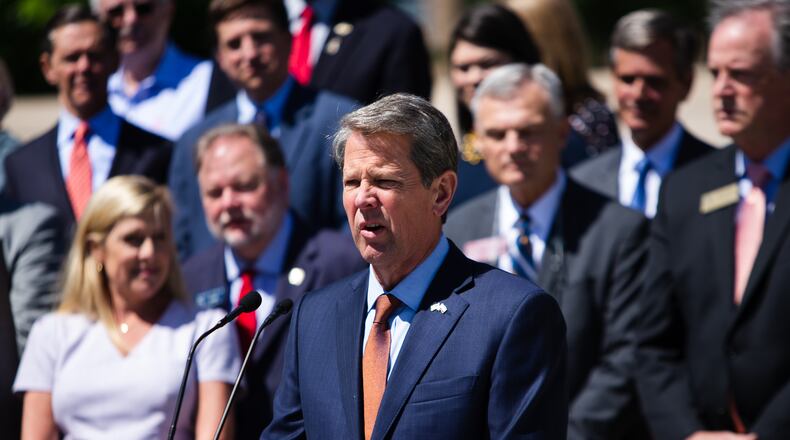Gov. Brian Kemp on Monday signed a $27.2 billion budget for the coming fiscal year that includes additional money for schools, health care, road building and pay raises for some front-line employees.
Kemp will hold press conferences in Atlanta, Columbus, Valdosta and Augusta Tuesday to discuss the spending plan for fiscal 2022, which begins July 1.
The budget broadly followed Kemp’s proposal — released in January — to backfill spending cuts that lawmakers made in 2020 due to the pandemic.
“Like so many Georgians at their own kitchen tables during the COVID-19 crisis, we all worked together,” Kemp said. “We planned for the unknown and made tough decisions in tough times.
“As a result of that work, the budget I signed ... puts Georgia on the path to a safer, brighter, and more prosperous future.”
The General Assembly in June 2020 cut the budget by 10% because it feared tax collections would plummet. That didn’t happen: Tax collections have improved with Georgia’s economy, so much so that the state will likely see a hefty surplus when its fiscal year ends June 30.
The state is also receiving $4.7 billion or so from the latest federal COVID-19 relief plan.
The spending plan the governor signed Monday includes pay raises in areas where there is high turnover in state government, such as for staffers in the Department of Driver Services and prison and juvenile justice guards. It does not include a pay raise for all rank-and-file employees or teachers.
It would spend $40 million on a rural innovation fund and $10 million to extend high-speed internet in rural areas, an effort that will likely also get a big boost from the federal COVID relief package.
Lawmakers agreed to backfill 60% of the education spending reductions that lawmakers approved last year.
Senate Appropriations Chairman Blake Tillery, R-Vidalia, noted in March that Georgia schools are getting about $6 billion from the federal COVID-19 relief bills, more than enough to make up for past state funding cuts. Including the federal relief money, Tillery said, schools will have far more money to spend next year than they did before the COVID-19 spending cuts.
In the fiscal 2022 budget, the state will borrow about $1 billion for construction projects, much of it going for new schools, college buildings, roads and bridges, and a convention center in Savannah
The state will also spend more money on nursing homes hit hard by COVID-19 and medical providers. About $60 million more is allocated for various mental health programs, some of which have been overwhelmed by the impact the pandemic has had on mental health and addiction problems.
The budget adds staff to a number of agencies, including the Department of Community Health, the state ethics commission, the Department of Revenue and the secretary of state’s office.
About the Author
Keep Reading
The Latest
Featured





